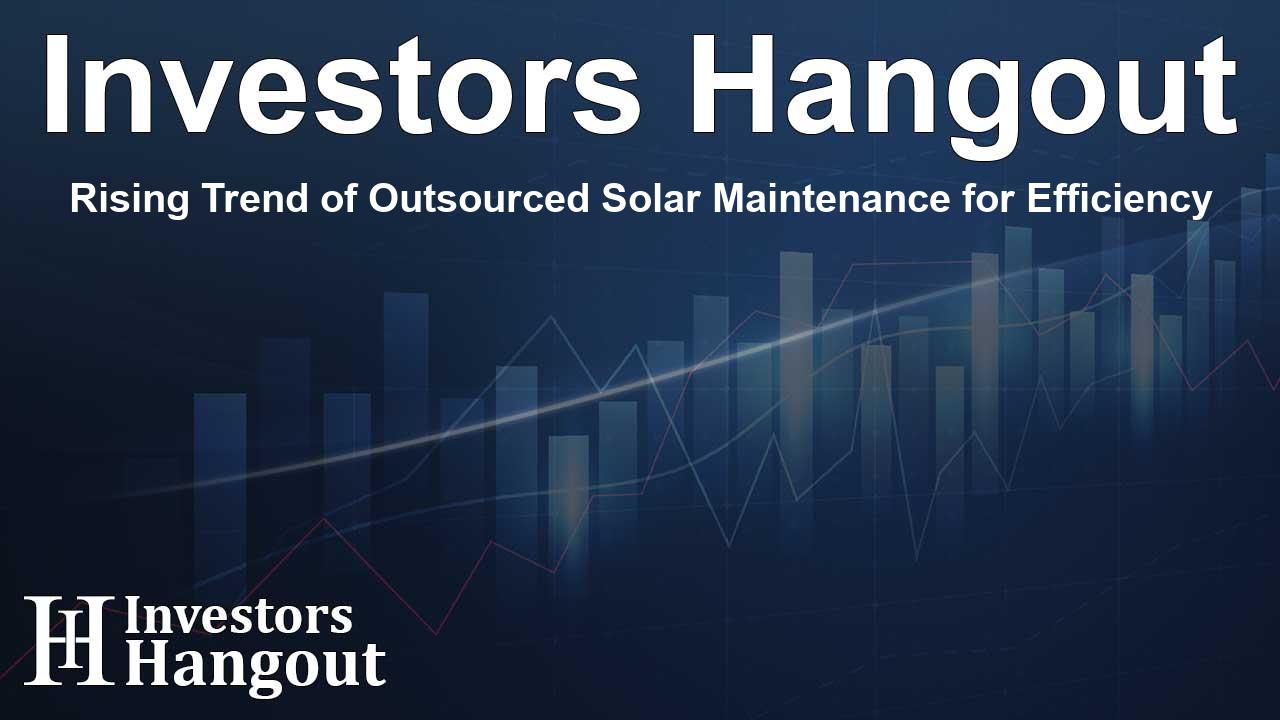Rising Trend of Outsourced Solar Maintenance for Efficiency

Outsourcing Solar Maintenance: A Growing Trend
A noticeable shift is occurring in the solar industry, as more companies are opting to outsource their solar maintenance operations. Recent findings indicate that 55% of companies are now relying on third-party experts for maintenance services. This trend responds to the growing gap in specialized skills and resources that many organizations face.
The Global Landscape of Solar Maintenance Outsourcing
In a comprehensive survey led by Fluke Corporation, a well-known name in industrial tools and software, the results reveal intriguing insights into the outsourcing climate. The study surveyed various OEMs, technicians, and installers across multiple regions, emphasizing a global trend toward outsourcing. Notably, the figures indicate that 54% of U.S. companies are also outsourcing their solar maintenance, slightly below Germany's 60% and above the UK's 48%. This demonstrates varying levels of reliance on external expertise across different countries.
Reasons Behind the Shift
The key factor propelling this trend is a substantial shortage of in-house technical skills necessary for effective solar maintenance. As the industry evolves rapidly, the need for specialized training and knowledge grows, with many companies finding it more efficient to partner with external service providers. The same survey found that 75% of participants plan to continue or expand their partnerships with external maintenance providers, indicating a commitment to this operational strategy.
Future Implications for Solar Maintenance
Looking ahead, the future of solar maintenance outsourcing seems promising, particularly with 71% of U.S. companies stating they will maintain their outsourcing strategies. In stark contrast, Spain and Germany have remarkably committed to this approach, with around 90% anticipating an increase in external collaborations. The UK appears to trail slightly behind, with just 58% of companies believing they will rely more on external providers.
Challenges in the Industry
As companies turn to outsourcing, several challenges remain, particularly concerning the effectiveness of maintenance strategy. A concerning statistic revealed that 30% of companies surveyed admitted their maintenance approach is either reactive or non-existent. Additionally, nearly 60% highlighted a critical lack of training for technicians, particularly in advanced diagnostic tools, which raises concerns about long-term sustainability.
Focus on Training and Technology
To address these existing challenges, companies are beginning to pivot their strategies toward training their technicians on advanced tools. Nearly 60% attribute their future plans to training initiatives, while around 53% prioritize implementing predictive maintenance strategies. There’s a tangible recognition that improving reliability and reducing downtime must be central to operational planning.
Regional Differences in Priorities
It's interesting to note the regional differences in approach. For instance, in the UK, data collection protocols are prioritized by 56% of companies, while training comes just slightly behind at 52%. However, in the U.S., the focus shifts, with 60% prioritizing technician training over data collection, which appears to be considerably lower in Germany, where only 38% deem it a priority.
Survey Demographics and Representation
The survey conducted by Fluke involved over 400 professionals and revealed a wide representation of roles, with technicians making up 45.6% of respondents. A considerable portion, nearly 63%, hailed from the U.S., highlighting a significant U.S. presence in the solar maintenance landscape. The group included a variety of company sizes, showcasing small enterprises alongside larger organizations.
About Fluke Corporation
Founded in 1948, Fluke Corporation is renowned for its innovative electronic test tools and software, serving not just the solar industry but also a broad array of sectors, including electrical and industrial maintenance. Their tools ensure that technicians can effectively measure and monitor equipment conditions, contributing to overall operational efficiency.
Frequently Asked Questions
What is the primary reason companies are outsourcing solar maintenance?
The main reason is the critical shortage of specialized skills and resources within companies, prompting them to seek external expertise.
How many companies plan to continue outsourcing maintenance?
Approximately 75% of the surveyed companies indicated they would continue or expand their partnerships with external maintenance providers.
Which countries are leading in solar maintenance outsourcing?
Germany leads with 60%, followed closely by Spain, indicating almost 90% of companies there are expected to outsource.
What challenges do companies face when maintaining solar equipment?
A significant challenge highlighted by the survey is the lack of training for technicians in advanced diagnostic tools, as well as a reactive or non-existent maintenance strategy in some cases.
Who are the main respondents of the Fluke survey?
The survey included a diverse representation of over 400 OEMs, technicians, and installers, with a large proportion based in the U.S.
About The Author
Contact Henry Turner privately here. Or send an email with ATTN: Henry Turner as the subject to contact@investorshangout.com.
About Investors Hangout
Investors Hangout is a leading online stock forum for financial discussion and learning, offering a wide range of free tools and resources. It draws in traders of all levels, who exchange market knowledge, investigate trading tactics, and keep an eye on industry developments in real time. Featuring financial articles, stock message boards, quotes, charts, company profiles, and live news updates. Through cooperative learning and a wealth of informational resources, it helps users from novices creating their first portfolios to experts honing their techniques. Join Investors Hangout today: https://investorshangout.com/
The content of this article is based on factual, publicly available information and does not represent legal, financial, or investment advice. Investors Hangout does not offer financial advice, and the author is not a licensed financial advisor. Consult a qualified advisor before making any financial or investment decisions based on this article. This article should not be considered advice to purchase, sell, or hold any securities or other investments. If any of the material provided here is inaccurate, please contact us for corrections.
